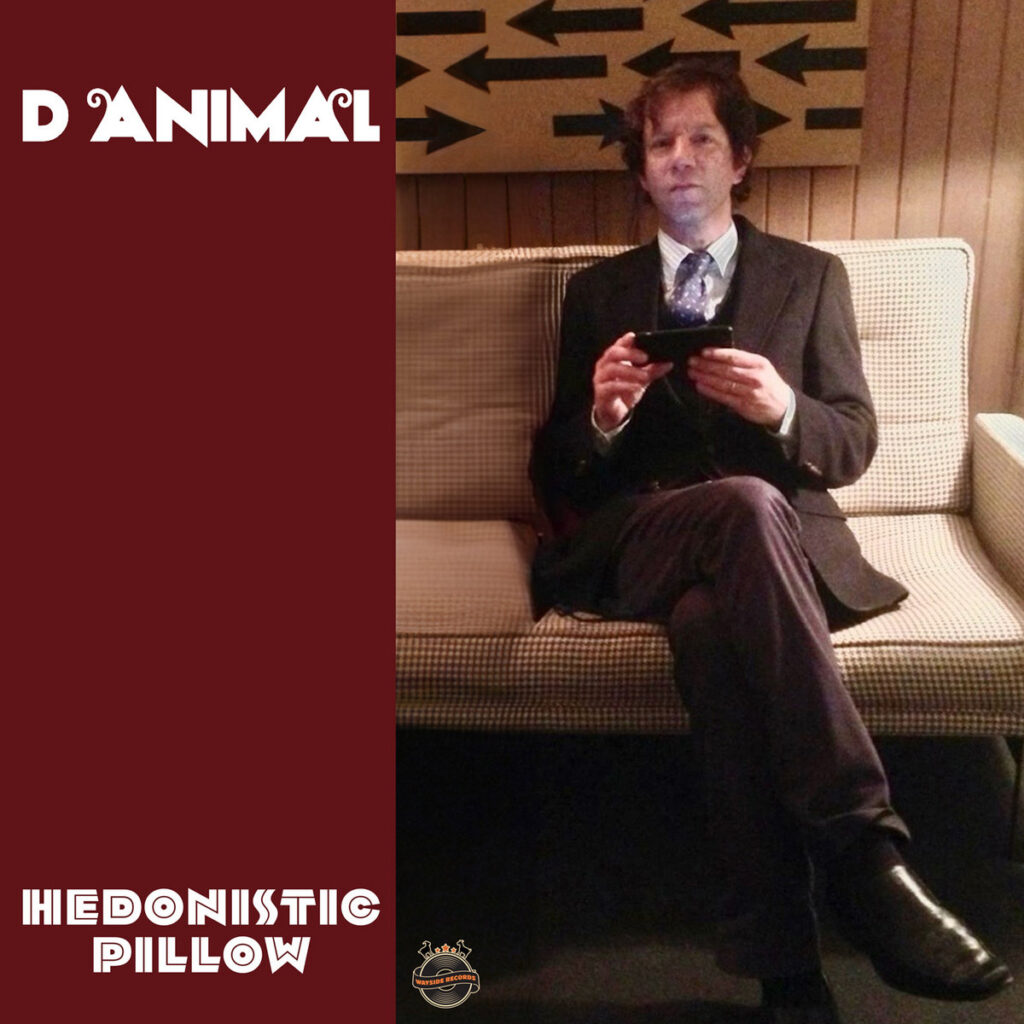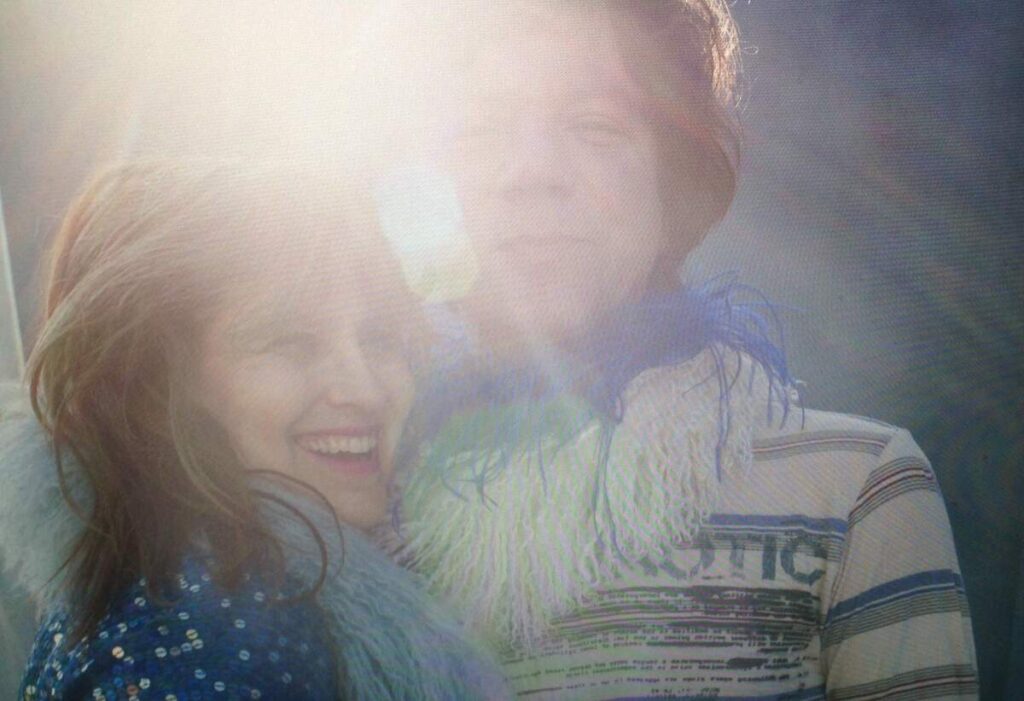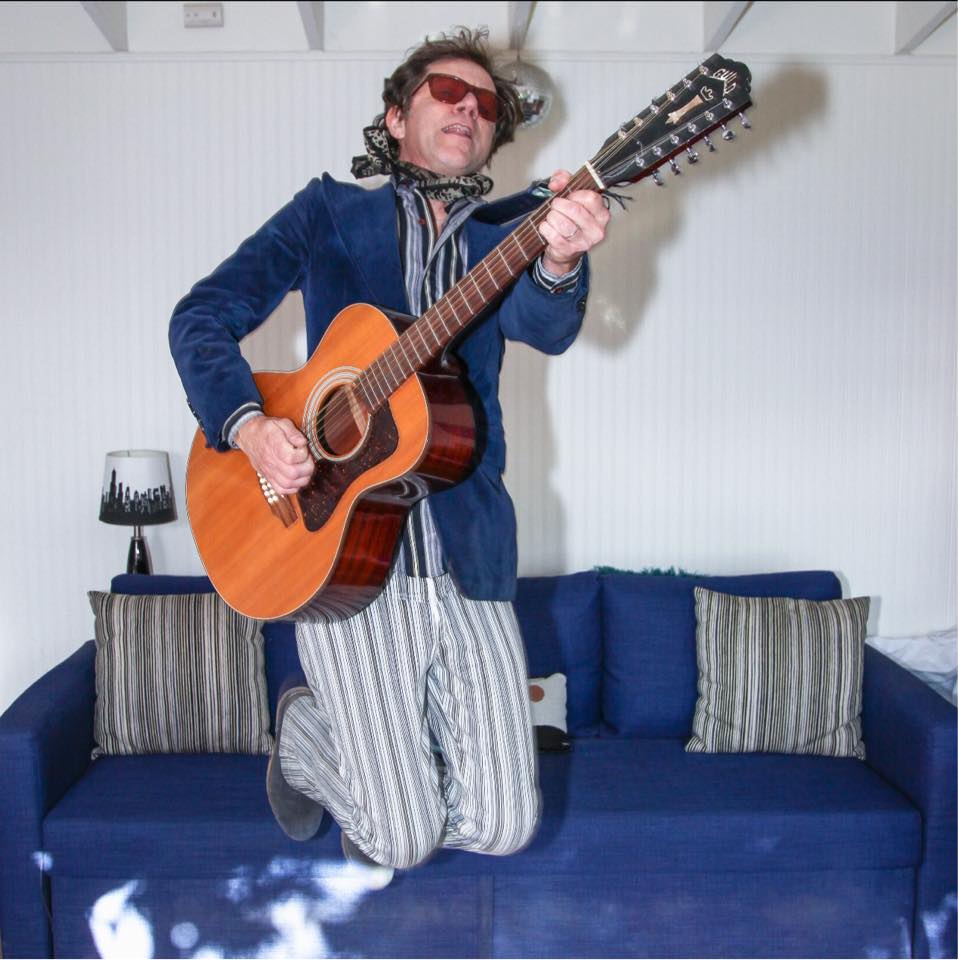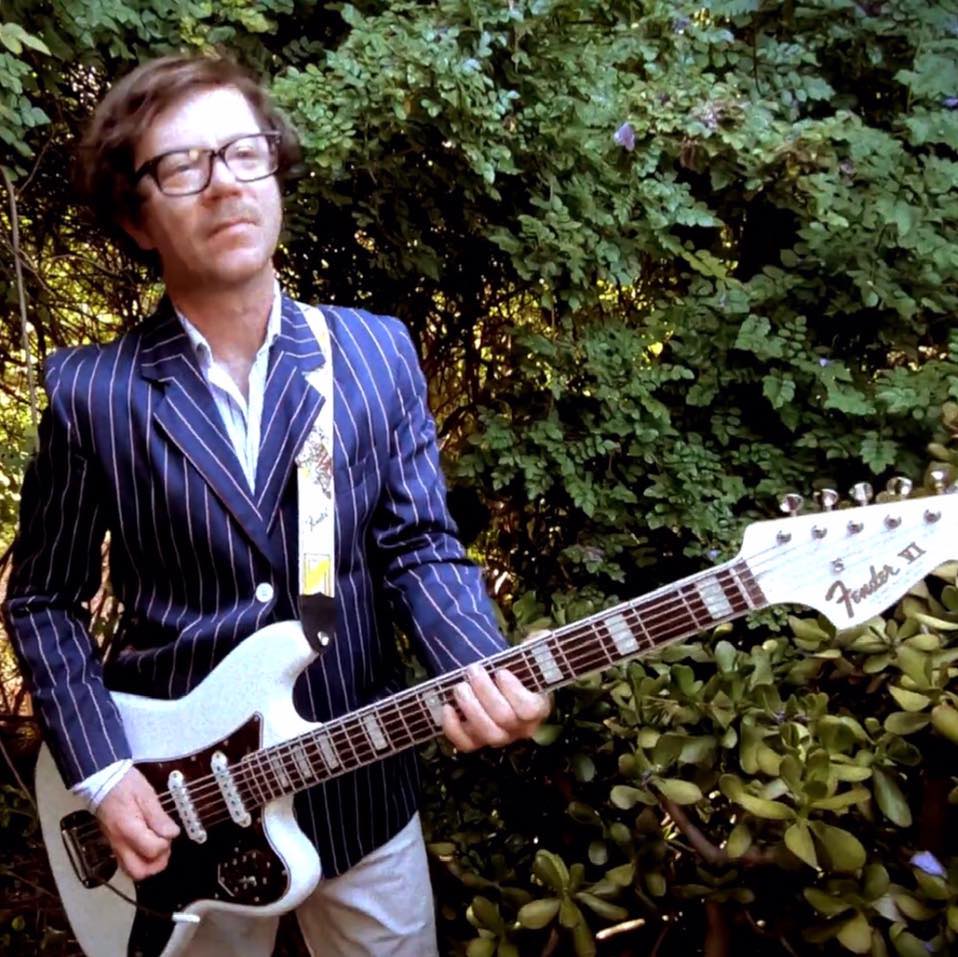Dan West | d’Animal | Interview | New Album, ‘Hedonistic Pillow’
Dan West’s newest release, ‘Hedonistic Pillow,’ envelops you in a whirlwind of indulgence, wielding both subtlety and force like a velvet-clad hammer.
This sonic adventure glows with neon hues and explores the shadowy corners of life’s untamed pleasures, exposing both grit and glamour in equal measure. West’s voice glides over sinuous guitar riffs and throbbing bass lines with natural confidence, invoking the spirit of rock’s heyday while remaining undeniably modern. Every song on this album is a visceral journey, drenched in raw emotion and charged with a tantalizing sense of danger. ‘Hedonistic Pillow’ transcends mere music; it’s an all-out sensory onslaught, defying the polished façade of today’s mainstream sounds. In an era where safety often reigns supreme, Dan West’s latest offering is a bold challenge, an invitation, and a revelation.
In this following interview, Dan West candidly discusses his eclectic musical journey, from his early influences and personal losses shaping albums like ‘Hedonistic Pillow’ to his upcoming big band project ‘State Of Swing.’ Reflecting on his collaborations, solo ventures, and even a documentary about his father’s life, West offers a glimpse into his deep-rooted passion for music and storytelling, all while sharing insights into his latest inspirations and favorite albums.

“This album emerged during a period of significant personal loss”
Can you tell us about the initial inspiration behind creating the ‘d’Animal’s Hedonistic Pillow’? Were there specific musical, literary, or artistic influences that shaped its inception?
Dan West: The very first music I heard as a kid was folk and classical music. I’ve always loved storytelling songs and multi-layered orchestration. That blend is the heart of much of my work. I also admired folk rock bands like The Association and The Byrds for merging storytelling with intricate musical arrangements.
This album emerged during a period of significant personal loss. Those emotions heavily influenced the music. My father passed away in 2023, and during the pandemic in June 2020, I lost my 19-year-old cat, Falipa. Reflecting further back, the loss of my mother in 2007 also resonates in some of the older songs on the album. While there are moments of optimism, the predominant theme is loss, including other forms of personal and existential loss.
Walk us through the creative process behind crafting the album. How did ideas evolve from conception to the final recording?
‘Hedonistic Pillow’ grew from a diverse collection of songs I developed over many years, spanning from around 2005 to 2023. Interestingly, these songs came together somewhat haphazardly over time. As I narrowed them down to the final 12 tracks and began mixing, I was surprised by how cohesive they felt as a collection. It was almost as if they were destined to be together from the start, with the seed planted two decades ago. It was musical kismet.
Two songs, ‘Falipa’ and ‘O Lucky Man,’ were initially recorded as a double A-side single during the pandemic, though only ‘Falipa’ was released. ‘Sublime Port’, originally intended for LoveyDove’s ‘Rude Dawgs’ album (2022, Wayside Records), found its place here after reevaluation. During the lockdown in 2020, Jerry Buszek (Sidewalk Society, Sexies) laid down most of the drums at TomorrowLabs, while additional recordings were done at various studios. I even contributed drum tracks at Ron Blake’s studio. Chris Tristram, a former bandmate from Mono For One in the 2000s, played bass and handled mixing for tracks like ‘A.D.D.’ and ‘Missing In Action’. Chris’ bass work on the new album is particularly notable.
The intensive phase of finalizing the album occurred over a few months, where disparate elements—drum machines, real drums, synths, programming—needed to be integrated. This process was swiftly followed by mastering from Adam Lasus (Clap Your Hands Say Yeah, Yo La Tengo). The result is a culmination of years of work and a testament to the album’s evolution and emotional depth.
Can you share more about the recording and production process for your latest album?
Elements from the original demos often persist through to the final mix for most, if not all, songs on ‘Hedonistic Pillow’ and across my back catalog. These demo origins contribute essential instrumentals or vocal parts that remain integral to the final mastered tracks.
The 1960s held a unique significance in music history. Could you expand on what that decade represents to you, considering its profound influence on your entire career?
The period from 1965 to 1968 stands out prominently for me. From the outset of my musical journey, the 1960s in general, and specifically the mid-60s to late-60s, have profoundly shaped the emotional and spiritual essence of my work across all facets of music that resonate with me.
It was an era where the power of ideas and passion made a significant impact. The proliferation of garage bands remains vivid in my memory, and collections like Nuggets and Pebbles truly captured the expansive and influential musical landscape of those years. It feels like an endless reservoir of creative musical treasures. Additionally, figures like John Coltrane and his quartet from the early to mid-1960s exemplified groundbreaking jazz innovation. Beyond music, the era saw the advent of figures like Warhol and Mary Quant, who pushed boundaries with a social and political conscience.
While I acknowledge the era wasn’t without its flaws—such as the ongoing racism in the South and the Vietnam War—it was a time of monumental change fueled by collective action. Today, more than ever, we could benefit from that unity, moving beyond the fleeting comfort of hedonism to address deeper societal needs.
As your latest album has a very intimate side to it, could you share your insights on the album’s tracks?
‘Falipa’ – This song is a tribute to my beloved cat whom I lost on June 8, 2020. She slept on top of me every night throughout her life, and I deeply miss her. Despite her small size, she had profound thoughts and was a constant source of comfort.
‘A.D.D.’ has been a persistent challenge throughout my life. It continues to affect me, but I’ve made strides in recent years to ‘focus, concentrate, relax, understand.’ Now, where did I put my phone?
‘I Wish I Knew’ – This song delves into the pain of romantic loss, questioning whether the love was ever real to begin with. The first demo dates back to 2007, the same year my mother passed away.
‘Jethro’ – In the 1990s and 2000s in the San Fernando Valley, I encountered many individuals like Jethro—lost and troubled souls who never received the love they needed as children, leading them to act out and perpetuate a cycle of dysfunction.
‘Missing In Action’ – The initial inspiration for this song came from a demo I created on a toy keyboard during the Bush II administration. It reflects my belief then and now that some people are truly ‘missing in action,’ disconnected from reality and failing to engage with critical issues when we need everyone’s involvement.
‘O Lucky Man’ – This song is a homage to both the song and the film, ‘O Lucky Man!’ My favorite in the Lindsay Anderson/Malcolm McDowell trilogy, it injects much-needed positivity and affirmation into the album.
‘Hollywood Moment’ – This track explores the loss of innocence when one encounters the harsh realities of the “star maker machinery.”
‘New Century’ – This song paints dystopian visions through a quasi-religious lens, reflecting on the challenges of a new era.
’21st Century Girl’ – It captures the loss of innocence mixed with misplaced affection in the modern world.
‘Torn Up Pieces Of Paper’ – Written during a songwriting workshop called The Nitpickers in 2008/2009, this song pieces together the fragments of a lost relationship.
‘All The Buttons’ – This song reflects on our desperate attempts to save ourselves, trying every solution, creating countless apps, yet still struggling to find the answers.
‘Sublime Port’ – Serving as a counterpart to ‘Falipa,’ this song symbolizes my farewell to Falipa as she journeys into the unknown, always remaining a sublime port in the vast universe. Azalia contributed the title and main guitar riff, highlighting how elements from the demo made it into the final mix.
Let’s delve into your past. You started playing multiple instruments at a young age. Can you share some of your earliest memories of music and how they influenced your career path?
My parents were both very creative and nurtured my creativity throughout my life. My dad owned multiple tape machines—reel to reel, cassette, and more. I loved recording my friends and myself, creating routines, riffing on pop music performances, and just goofing around in typical adolescent fashion. I progressed from simple recordings to sound on sound techniques, and eventually acquired my first Tascam 4 Track recorder. At the time, I was working at La Fondue Bourguignonne, a French restaurant in Sherman Oaks, and pooled all my tip money to buy the Cadillac of Teac 4 Tracks, the Tascam 246!
I’ve always been fascinated by musical instruments from a young age. When I expressed interest in playing guitar around age 7, my dad insisted I first study piano with my mom for a year. Within six months, I had earned my guitar. As soon as I could strum a few basic chords, I started composing songs. Music was everywhere, with influential musicians and performances shaping my early years. One of my earliest autographs was from Eubie Blake, the pianist who famously published the first Ragtime composition. My mother introduced me to him after a performance at Dorsey High School when he was 96!
Our home was filled with musical instruments that I eagerly picked up and experimented with. We had an African drum, kalimba, recorder, banjo, ukulele, and of course, the piano. I learned to play them all and later added drum set and bass to my repertoire. By the time I was in middle school, I was already multitracking—something not many kids my age were doing back then. Those early experiences with my dad’s tape machines and my experimentation with recording multiple instruments and layers laid the foundation for my musical journey.
How do you approach the creative process when working on a solo project versus collaborating with others?
I tend to get into less trouble when collaborating! On my own, I often explore various genres, including jazz and classical music. When collaborating, the other artist becomes a focal point for me. Adopting the ‘d’Animal’ moniker helps me channel a distinct character, whereas as Dan West, my creativity can span anything and everything.
In recent years, you’ve ventured into producing and arranging for other artists. How has this experience influenced your approach to creating your own music?
Producing and arranging for other artists has definitely refined my approach. It allows me to step back and engage with music from different perspectives, focusing on various aspects of the creative process. Not being the primary artist on a project liberates me to experiment more technically, without the pressures of singing and playing all parts. Balancing both sides of the production process can be isolating and draining over time. Collaborating with others, whether as an artist or producer, brings a refreshing change.
LoveyDove is celebrated for its eclectic blend of styles. As a real-life couple, how does your personal relationship influence your musical collaboration? Can you describe how your dynamics as partners translate into your creative process and the music you produce together?
We share a deep passion for music with significant overlap in our tastes. When creating LoveyDove albums, we start with a concept and trust each other’s instincts to guide us forward. Azalia and I know each other so well that navigating creative differences becomes easier; we can support each other even when our passions diverge on certain aspects of a project.
Over the years, we’ve found success in maintaining a clear separation between our personal and professional lives. This balance allows us to nurture both our relationship and our music without one overshadowing the other.

How do you approach crafting a cohesive narrative across an entire album?
For me, a cohesive narrative starts with a concept right from the outset—whether it’s a word, phrase, or overarching theme. However, ‘Hedonistic Pillow’ was unique in that its narrative evolved organically during the refining of the tracks. I didn’t initially conceive the album as ‘Hedonistic Pillow’ and then craft songs to fit that theme; rather, the theme emerged naturally as I honed the songs.
You’ve performed live extensively, both locally and internationally. How does your approach to performing live differ from studio recording? What aspects of live performance do you find most fulfilling?
Live gigs are exhilarating for me, especially when the audience connects with the performance. The energy exchange is palpable and fulfilling. In contrast, the studio environment is like living under a microscope. I believe it’s crucial to maintain a loose, fun atmosphere in the studio to prevent it from becoming sterile. (I’ve heard that Rolling Stones recording sessions resemble big parties!)
If you’re a control enthusiast, live performances can be challenging because you have to let go and ride the wave of energy in the moment, focusing less on details. In the studio, however, every detail matters. The trick is to preserve the spontaneity and energy of live performances within the structured confines of a controlled studio environment.
LoveyDove’s sound has evolved significantly over the years, from your debut album to recent releases like ‘Rude Dawgs.’ How do you envision your musical style and direction evolving in the future?
Azalia and I thrive on having a conceptual framework for our music. Our debut album aimed for a grand classic pop sound inspired by Phil Spector and Carole King. ‘ShowStopper,’ our second album, took on a dance party vibe with electronic flourishes. ‘Rude Dawgs,’ completed during the pandemic, delved into darker themes with protest-laden lyrics and a heavy psychedelic, guitar-driven rock feel.
As for the future, we’re open to new directions, though I sense a return to a boogie-infused sound might be on the horizon. The evolution of our music will likely continue to be guided by conceptual ideas that inspire and challenge us creatively.
Could you walk us through the creative journey behind your upcoming big band album, ‘State Of Swing’?
Big band music has always held a special place in my heart. The jazz influence in my music stems from my mother, who, during her tenure as the publicity director at The El Rancho Vegas in the late 1950s, dated Gene Krupa. I could digress into stories about her remarkable career, but suffice it to say, she was an extraordinary person. In high school, I began exploring her extensive vinyl collection and made significant discoveries—Bill Evans, Ornette Coleman, Thelonious Monk—artists who blew my mind on a daily basis. It was also during this time that I deepened my piano skills and studied music theory under Ted Greene, Terry Trotter, and Clare & Dirk Fischer.
My fascination with layering and orchestral sounds led me to pursue a composition major at Cal State Northridge, where I had the privilege of playing in the Jazz A Band under Prof. Joel Leach. It was there that I fell in love with the big band genre. My compositions were featured in A band concerts, and jazz critic Herb Wong became a strong advocate of my work. After graduation, I began working as a professional arranger and pianist, gradually building up a substantial catalog. Similar to my solo rock albums, I would compose big band arrangements between gigs, resulting in a considerable collection over the years.
During the lockdown, I made the decision to professionally record my arrangements. Most of my big band works had only been captured live, often lacking in quality recordings. ‘State Of Swing’ is the culmination of this effort to finally document my compositions in a definitive studio setting.
The Sidewalk Society retrospective sounds like a significant project…
Sidewalk Society holds a significant place in my musical journey. Guitarist Danny Lawrence and I grew up together and initially formed our first band, The Mod Sqod. Bonding over our mutual love for The Who Sell Out, we immersed ourselves in the Mod/Psych scene. Over the years, The Mod Sqod evolved into Sidewalk Society. Concurrently, I also played in another psychedelic-influenced band called Threw The Lookinglass. Both bands were integral to the vibrant Paisley Underground scene of the 1980s, performing at iconic venues such as The Troubadour, Madame Wong’s East and West, and The Roxy. Our 4-track recordings even earned airtime on Rodney Bingenheimer’s “Rodney On The ROQ” radio show.
After a period of divergence, Danny and I serendipitously reunited at Taix Restaurant in Echo Park during Thanksgiving weekend in 2006. This reunion sparked the revival of Sidewalk Society in 2007, coinciding with a resurgence of the mod/psych movement in the late 2000s and early 2010s. Our original drummer, Tyrone Rio, eventually departed, and Jerry Buszek (known for his work with Sexies and The Shakes) joined the band. Embraced by the prog/psych label Fruits De Mer Records in the UK, we have since released 3 full-length albums, 2 EPs, and contributed to multiple compilations. These recordings form the basis of the double album retrospective FDM is set to release later this year.
Then there’s a documentary about your father’s life…
As I mentioned earlier, the completion of ‘Hedonistic Pillow’ coincided with a period of profound loss, culminating in the passing of my dear Papa West on March 4, 2023.
Dad lived through an extraordinary era in Hollywood and U.S. history. He began as a child actor in the late 1930s and later became an MGM contract player in the 1940s, starring alongside Darla Hood in the film ‘Happyland,’ which also marked Natalie Wood’s screen debut. From 1950 to 1952, he served in Korea, earning a Bronze Star and writing an official book published by the army documenting the Korean War effort. Upon returning, he pursued a career writing for iconic TV series like The Virginian and Lassie.
After Dad’s passing, Azalia and I felt compelled to share his remarkable story. Initially, I intended to provide Azalia with material from our family archives for her to compile the documentary. However, as the project progressed, I became increasingly involved and eventually took charge of completing it myself. This decision stemmed from my intimate knowledge of Dad’s life chronology, and my desire not to overwhelm Azalia with constant revisions. She taught me the basics of iMovie, and voila! My first foray into documentary filmmaking! The initial cut runs 42 minutes and is available on my YouTube channel. I plan to expand it into a full-length feature over the coming years and seek out distribution opportunities.
Let’s conclude this interview with some of your favorite albums. Have you discovered anything new lately that you would like to recommend to our readers?
Mazie – ‘Blotter Baby’ (2023)
Vinyl Williams – ‘Aeterna’ (2023)
These two releases from the past year feature inspired melodic material with exceptional and surprising harmonic depth. While their production styles differ, they both offer refreshing approaches to classic psych/pop music, signaling a renaissance in the genre.
On the jazz front, DOMi & JD BECK are pushing harmonic boundaries akin to Alan Holdsworth’s expansive use of melody and harmony. And Jacob Collier—wow!—his talent is formidable, and I’m eagerly anticipating his evolution over the next decade.
Azalia’s new album ‘Powerlover’ is a blast, and I thoroughly enjoyed contributing the bass lines to it. Azalia consistently remains true to herself, continuing to inspire not only me but also a community of free-thinking artists who admire her work.
The video ‘Still Hanging On’ was directed by Francis Stokes, known for his work with Oscar-nominated actors Karen Black and John Hawkes in the acclaimed film Buttleman.
Regarding classics, I still find myself returning to timeless albums like The Who’s ‘The Who Sell Out,’ Thad Jones/Mel Lewis’ ‘Recorded Live at the Village Vanguard,’ The Association’s ‘Greatest Hits,’ Dusty Springfield’s ‘Dusty in Memphis,’ and a wealth of music from the 1960s and early 1970s. The Carpenters, The Kinks with ‘The Kinks Are The Village Green Preservation Society’—the list goes on and on.

Thank you for your time and interest. The final word is yours.
I appreciate your support and the opportunity to showcase my music through It’s Psychedelic Baby Magazine. You’ve been incredibly supportive of Azalia, me, and our band LoveyDove. Wishing you all the best, and thank you once again!
Klemen Breznikar
Headline photo: Michelle Felix
Dan West Facebook / Bandcamp / YouTube
Azalia Snail | Interview | New Album, ‘Powerlover’




